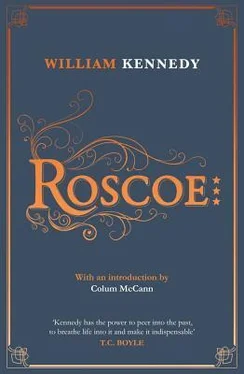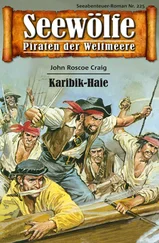As he walked along the river road, Roscoe saw the Pope riding the Papal bicycle up from the quay, and he said, “Hello, Pope, where are you headed?” The Pope explained that Patsy had invited him to judge a fox-trot contest at the Armory, a fundraiser for the Little Sisters of the Poor.
“I was rereading Habakkuk, Your Holiness,” Roscoe said, “and I wonder, as Habakkuk did, how can God remain silent while the wicked prosper?”
“Remember, my son, that God reassured Habakkuk that the divine way will prevail over wickedness. But it takes a while.”
“How can he let the arrogant and the rapacious survive, while the innocent suffer?” Roscoe asked.
“God did say he would subdue the drought god Mot and the sea god Yam,” said the Pope.
“Mot and Yam, it’s a beginning,” Roscoe said. “But what about the damn Governor?”
“Woe to him,” said the Pope, “who builds a town with blood, and founds a city on iniquity.”
“Are you talking about any town I know?” Roscoe asked.
But the Pope was already cycling on to the dance.
There is nothing like the back room of a dimly lit bar on a summer afternoon when the heat is smothering the city’s life; and so Roscoe has come to a half-walled private corner in Mike Quinlan’s dark dungeon of drink to triumph over this unseasonable heat, a ninety-eight-degree day when summer should be spent. A cold beer in a short glass, and then another, cures the heat in Roscoe’s heart, and the sweat of the glass cools the palm of his hand. Slowly the sweet placenta overgrows his brain, and the afternoon moves weightlessly along, as he waits for whatever comes next in his scheme to unleash the new Roscoe.
He has lost fifteen pounds since they stuck the needle in him, has recovered provisionally, is not out of the woods, but out of the wheelchair, and has sought retreat in Quinlan’s (proper name the Capitol Grill), across State Street from the Capitol, a spa for lawmakers, politicians, and newsmen, where Roscoe has been palming beer glasses since Mike Quinlan opened the place two days before repeal. It is where political winners host banquets in the large back room, and it’s a consolation pit for losers: piano music nightly (Al Smith often sang with this piano). Its walls are dense with photos of major, minor, and less-than-minor pols — FDR, Wendell Willkie, Jim Farley, Thomas E. Dewey, Patsy, Elisha, and Roscoe, among many — also with cartoon images of governors, senators, presidents in Napoleonic hats, dunce caps, admiral’s uniforms, Santa Claus suits, Roman togas, and underwear, riding donkeys, elephants, and dead horses, commanding sinking ships. Wherever you look you see images of yesterday’s politics fading away.
But the place has also given Roscoe pleasure, song, blue romance, and, in off hours, peace and solitude, which is what he is now seeking: an hour alone before Mac arrives with his difficult news. Mac had called headquarters asking Roscoe to meet him, a first for this exemplar of self-reliance, and when Roscoe asked, “What’s the problem?” Mac answered, “Chickens,” and Roscoe understood that the Patsy-Bindy feud was heating up.
What the hell ails Bindy? Why would he con Patsy after all these years? Well, there’s the usual rub of money, never enough, plus the brothel shutdown reminding him again he’s only a second banana in this town, which Mame often tells him. Patsy gives the orders, Patsy controls the wealth, Patsy has the famous chickens; and so Bindy needs to win. But he usually does: eight winners in eight races at his favorite trotting track last July, when Roscoe went with him; nine winners with his own trotters at nine different tracks the same season. He can’t gamble in Albany, because everybody knows he can’t lose— his dice, his cards, his dealers, his joints, his town — and players drop out when he drops in. Even when the game is straight, Bindy wins. So he leaves town to gamble, goes maybe to Troy, to Fogarty’s.
“Bindy always does exactly what he wants to do,” Patsy once said. Well, yes, but how could he think he could con not only Patsy but also the unconnable Tommy Fogarty? It seems to be in the man’s nature to believe the con will prevail, for he learned it early. Hawking newspapers at age ten, he also worked as lookout (for strolling cops) for young Midge Kresser as Midge worked his three-card monte game in front of the Broadway hotels. Bindy grew up among grifters and gamblers who liked sure things — Mush, for one, who taught him that stuffing a sponge up the nostril of a racehorse enhances its ability to lose. He and Mush subsidized card thieves who worked the trains and the night boats. He won twenty thousand at a crap game one night in Saratoga and was then arrested for using slugs to make calls on a public phone.
Yet Bindy is no miser, just a man who delights in deceit. He was always cheerful, a right guy, yes, generous, paid his debts, good company in joints like this, bought drinks for the crowd, gave losers taxi money home, always good for a touch, if you paid it back. Roscoe drank many a night with Bindy, always liked him, still does. But then he turned sour, grew farter after the Thorpe gang broke in on Mush, still Bindy’s partner, and burned his testicles with a candle to get the combination to his safe, which Mush yielded in exchange for medium-rare testes.
The Thorpes also brought in Lorenzo Scarpelli from Newark to kill Bindy over beer, for he and Mush (Patsy the true power, but always in the background) managed its total flow into Albany, and the Thorpes could not enter the market. Scarpelli fired three shots at Bindy on his front porch, all near misses. Bindy leaped into the bushes, betrayed by his spaniel, which wagged its tail at the bush. Scarpelli shot the bush and missed again, Bindy returned fire with the pistol he kept in his milk-bottle box, and Scarpelli sped away. Starved for action, Scarpelli crossed the river to Rensselaer, held up a bank, killed a guard, and was sentenced to the chair. Mush, Bindy, and Roscoe, all close to the warden at Sing Sing (who came to Albany to straighten himself out with gin after every execution), drove down to watch the Scarp sizzle.
The afternoon was so quiet that Roscoe could hear Georgie Moisedes open the tap and let the beer, still Stanwix, flow into one glass, then another. Cutie LaRue and Eddie Brodie had been sitting at the bar when Roscoe came in, and now he heard them talking.
“Let’s go tell Roscoe the campaign plan,” Cutie said.
“You don’t want to be seen talking to Roscoe,” Brodie said. “You’re supposed to be the enemy.”
“Yeah, don’t bother Roscoe back there,” Georgie said. “He wants company he’ll come out here.”
“He wants to be alone,” Cutie said.
“He’s figuring it out,” Georgie said.
“Figuring what out?”
“Whatever it takes.”
Smart. Georgie is smart; but not entirely; finally got enough money to open his own poolroom and card game, then bet it with Mush against Billy Phelan in a nine-ball match. When Billy won, Georgie handed Mush the door key, and went back to drawing beer for pols like Roscoe, whose glass is empty. Ros got up and walked to the bar, stood next to Cutie. Is this a free country? Cutie can’t talk to me? What will they accuse us of, conspiracy to confuse the election process? Cutie can’t win, can’t begin to win, so why is he running? Must be a Democratic trick — I saw him talking to Roscoe. Republicans already saying such things.
“Mr. Brodie, Mr. LaRue,” Roscoe said, pushing his glass toward Georgie with another in his eye.
“Glad to see you out and about, Roscoe,” Brodie said. “You had a siege of it.”
Читать дальше












